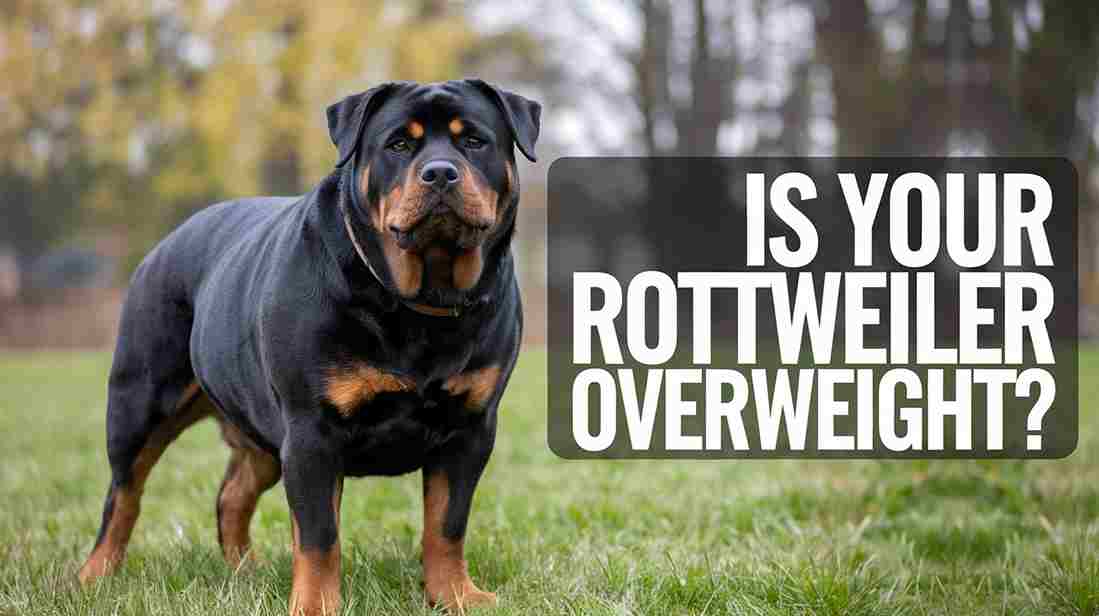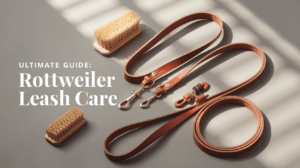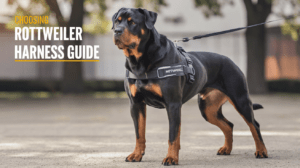Overweight Rottweiler: Key Takeaways
- ✓ Weight Standards: Male Rottweilers should weigh 95-135 pounds, females 80-100 pounds, with individual variation based on frame size.
- ✓ Health Risks: Excess weight can lead to joint problems, diabetes, respiratory issues, and shortened lifespan in Rottweilers.
- ✓ Weight Loss Plan: Successful weight management requires calculating proper caloric intake, choosing appropriate diet, and maintaining regular exercise.
- ✓ Exercise Guidelines: Start with short walks and gradually increase duration, incorporating low-impact activities like swimming for joint health.
- ✓ Maintenance Strategy: Regular weigh-ins, proper treat management, and consistent veterinary check-ups are essential for long-term success.
Before starting your Rottweiler on a weight loss journey, it’s crucial to understand the underlying causes of excessive eating to implement the most effective solutions. Understanding their eating habits will make the weight loss process more successful.
Is your Rottweiler looking a bit too chunky? According to the American Veterinary Medical Association, nearly 56% of dogs in the US are overweight or obese, and Rottweilers are particularly prone to weight issues. As a veterinarian who’s helped countless Rottie owners tackle this challenge (and dealt with my own Rottweiler’s battle of the bulge!), I understand the struggle is real.
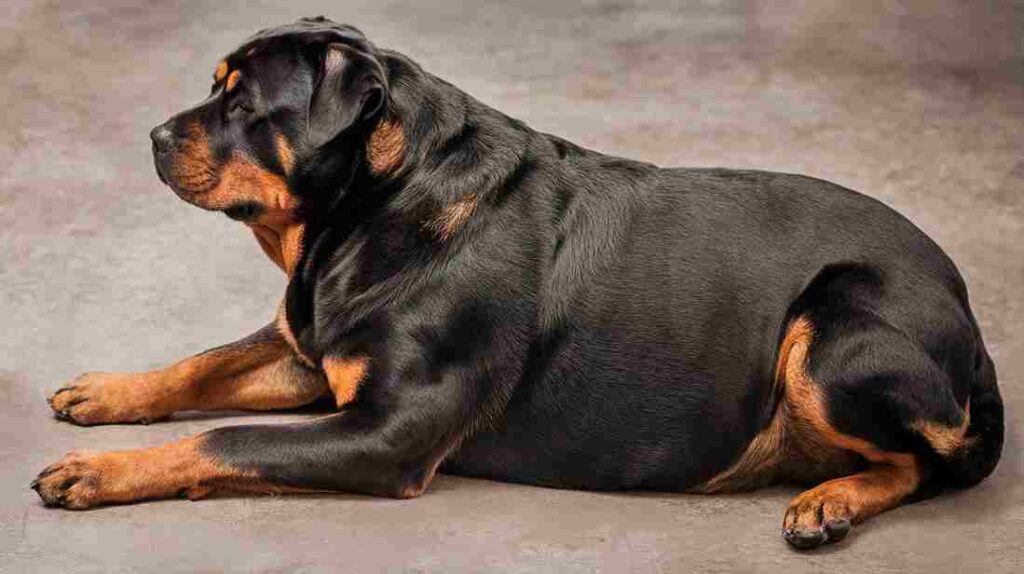
When my Rottweiler Max started resembling more of a bear than a dog, I knew it was time for action. The good news? Getting your loyal companion back to a healthy weight doesn’t have to be overwhelming. This comprehensive guide will walk you through everything you need to know about managing your Rottweiler’s weight – from understanding the ideal weight range to creating an effective weight loss plan that actually works.
Whether your Rottie has gained a few extra pounds or needs significant lifestyle changes, we’ll cover practical, vet-approved strategies to help your furry friend get back on track to a healthier, happier life.
Understanding Your Rottweiler’s Weight Problem
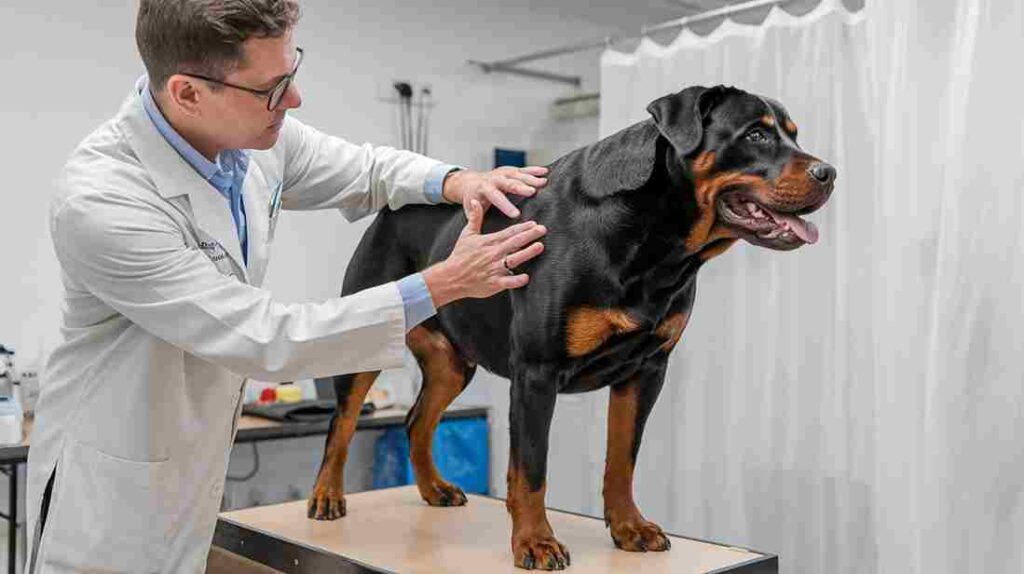
As a Rottweiler owner and veterinarian, I’ve noticed that many people struggle to recognize when their Rottie has a weight problem. Think of your Rottweiler’s body like a car – too much weight puts extra strain on the engine (heart) and suspension (joints). According to a Cornell University study, even just 2-3 pounds of extra weight can significantly impact a dog’s health.
Ideal Weight Range for Rottweilers
A healthy adult male Rottweiler should typically weigh between 95-135 pounds, while females should range from 80-100 pounds. However, these numbers aren’t one-size-fits-all. Your Rottie’s ideal weight depends on their frame size and muscle mass. A simple way to check is the rib test – you should be able to feel your dog’s ribs with light pressure, similar to feeling your knuckles when your hand is flat.
Health Risks of Obesity in Rottweilers
When Max, my Rottweiler, gained excessive weight, I witnessed firsthand how it affected his quality of life. Overweight Rottweilers face several serious health risks, including:
• Joint problems and early arthritis
• Increased risk of cruciate ligament tears
• Respiratory difficulties
• Higher risk of diabetes
• Reduced lifespan
• Decreased energy and exercise tolerance
Common Causes of Weight Gain in Rottweilers
Understanding why your Rottweiler is gaining weight is crucial for effective treatment. The most common causes I see in my practice include:
• Overfeeding – especially misinterpreting feeding guidelines on food packages
• Excessive treats – those puppy eyes are hard to resist!
• Lack of consistent exercise
• Medical conditions like hypothyroidism
• Age-related metabolism changes
• Genetics and breed predisposition
Remember, addressing your Rottweiler’s weight issues isn’t just about appearance – it’s about ensuring they live a long, healthy, and active life. In my experience, successful weight management starts with understanding these fundamentals and making informed decisions about diet and exercise.
Creating an Effective Weight Loss Plan
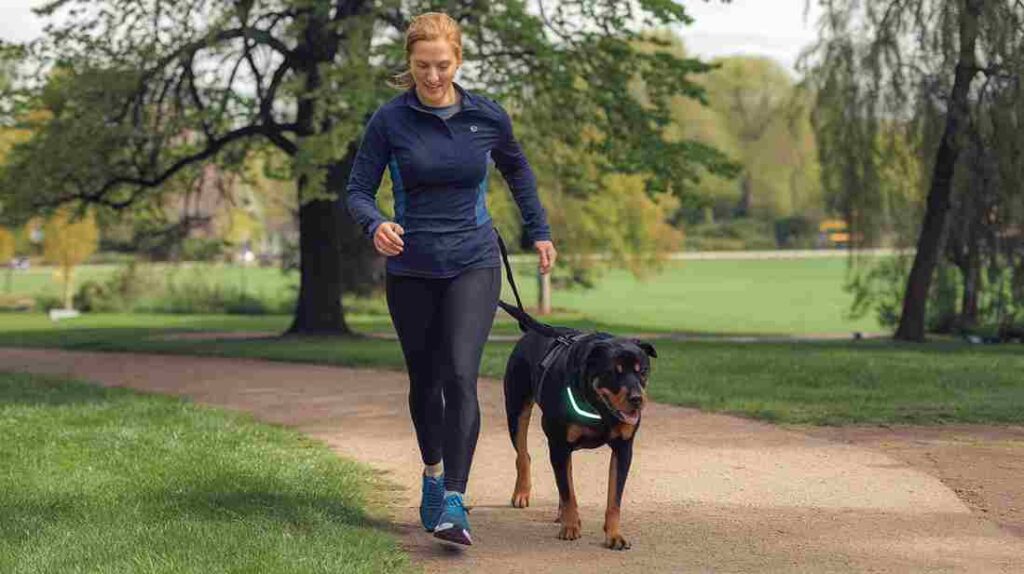
After helping hundreds of Rottweilers achieve their ideal weight in my veterinary practice, I’ve learned that successful weight loss requires a structured, personalized approach. According to the American Animal Hospital Association, dogs following a structured weight loss program are almost twice as likely to reach their target weight compared to those without a plan.
Calculating Daily Caloric Needs
Just like when I helped Max slim down, the first step is determining your Rottweiler’s ideal caloric intake. Think of calories like your dog’s fuel tank – too much fills the tank to overflow, while too little won’t keep the engine running. For a typical overweight Rottweiler, I recommend starting with their ideal weight in pounds × 10 = daily calorie needs. However, this is just a baseline – factors like age, activity level, and health conditions affect individual needs.
Choosing the Right Diet and Food Portions
Selecting the appropriate diet is crucial for successful weight loss. When my clients ask about food choices, I often compare it to human weight loss – quality matters as much as quantity. Consider these key factors:
• High-protein, lower-carb formulas to maintain muscle mass
• Measured portions using a kitchen scale
• Divided meals (2-3 times daily) to prevent hunger
• Consider weight management-specific formulas
• Gradually transition to new foods over 7-10 days
Exercise Recommendations for Overweight Rottweilers
Exercise isn’t just about burning calories – it’s about rebuilding strength and stamina. Start slowly and build up gradually. With Max, we began with 10-minute walks and eventually worked up to 30-minute sessions twice daily. Consider these weight-friendly activities:
• Low-impact walking on soft surfaces
• Swimming (excellent for joint health)
• Interactive play sessions
• Food puzzle toys for mental stimulation
• Gentle obedience training
Remember, weight loss should be gradual – aim for 1-2% body weight loss per week. Too rapid weight loss can be dangerous for your Rottweiler. Always start with a veterinary check-up to rule out any underlying health issues before beginning a weight loss journey.
Maintaining Your Rottweiler’s Healthy Weight
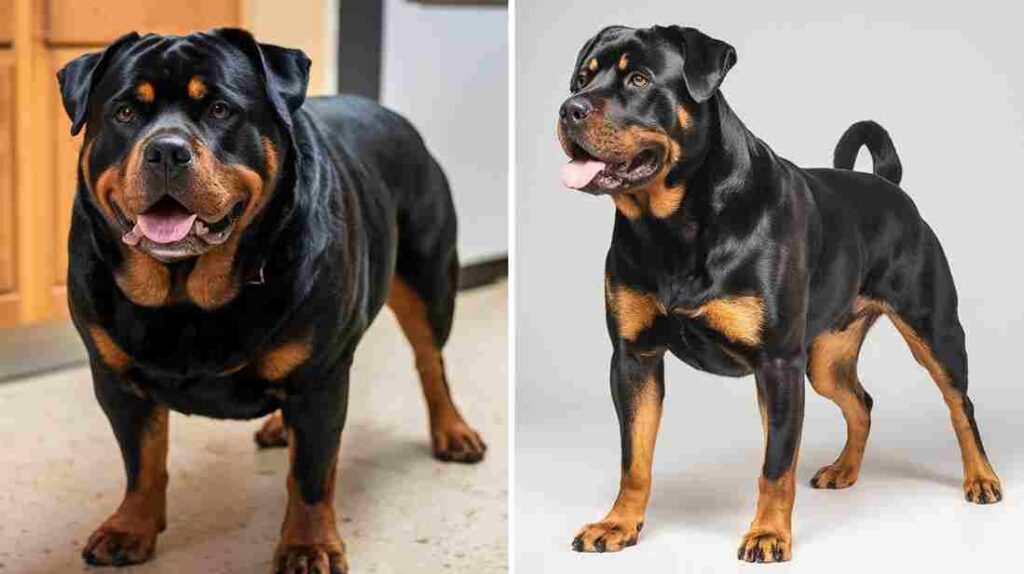
Once your Rottweiler reaches their target weight, the real challenge begins. According to a study in Frontiers in Veterinary Science, approximately 48% of dogs regain weight within 12 months after successful weight loss. I learned this the hard way with Max – after reaching his ideal weight, a few months of relaxed monitoring led to unwanted pounds creeping back on.
Monitoring Progress and Making Adjustments
Think of weight maintenance like keeping a ship on course – small, regular adjustments prevent major deviations. I recommend weekly weigh-ins during the first month of maintenance, then bi-weekly once stable. Use a weight tracking journal to spot trends early. Remember that seasonal changes, age, and activity levels might require caloric adjustments.
When monitoring your Rottweiler’s weight, consider these key indicators:
• Regular body condition scoring
• Measuring neck and chest circumference
• Monitoring energy levels and stamina
• Checking muscle tone and definition
• Observing coat quality and overall appearance
Healthy Treats and Feeding Habits
Treats shouldn’t disappear completely – they’re valuable training tools and strengthen your bond. The key is smart treat management. I teach my clients the 10% rule: treats should make up no more than 10% of daily calories. Consider these healthy alternatives:
• Fresh vegetables like carrots or green beans
• Small pieces of lean chicken
• Commercial low-calorie dog treats
• Using kibble from daily portions as treats
Working with Your Veterinarian
Regular veterinary check-ups are crucial for long-term success. Your vet can help identify early warning signs of weight gain and adjust the maintenance plan accordingly. During these visits, we typically:
• Review current diet and exercise routine
• Check for any developing health issues
• Adjust maintenance calories as needed
• Discuss any challenges or concerns
• Plan preventive care to support overall health
Remember, maintaining a healthy weight is a lifelong commitment. Just like maintaining a garden, it requires consistent care and attention. Stay committed to portion control, regular exercise, and scheduled vet visits. Your Rottweiler’s health and happiness are worth every effort.
Frequently Asked Questions About Overweight Rottweilers
Conclusion
Managing your Rottweiler’s weight is more than just a health goal – it’s an investment in their quality of life and longevity. Through my journey with Max and countless patient success stories, I’ve seen how achieving and maintaining a healthy weight can transform a Rottweiler’s energy, mobility, and overall happiness. Remember, every small step counts – whether it’s measuring portions more carefully or adding an extra five minutes to your daily walk. The key is to stay consistent and committed to your plan while remaining flexible enough to adjust when needed. With patience, proper guidance, and the right strategies, your Rottweiler can achieve their ideal weight and maintain it for years to come. Your dedication to their health today will reward you with many more active, joyful years together with your beloved Rottie.
As you work to get your overweight Rottweiler back on the path to health, it’s important to understand the common issues this breed can face and how to properly care for them. Be sure to review our Rottweiler Health 101: A Guide to Common Issues & Preventative Care to learn about conditions like hip/elbow dysplasia, heart disease, and more. Catching problems early and taking proactive steps can go a long way in keeping your Rottie happy and healthy for years to come.


